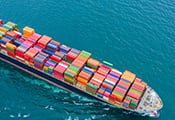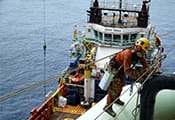Marine Insurance Articles
-
Popular Articles
-
Recent Articles
When moving to a new home, safeguarding your household articles during transit is crucial. Transit insurance...Read more
27 Oct 2020 by Policybazaar
18018 Views
Any shipment moving from one country to another requires customs clearance. Apart from international laws and...Read more
22 Nov 2022 by Policybazaar
13708 Views
Marine insurance and its advantages cannot be ignored if you are in a shipping business or your business needs...Read more
19 Aug 2022 by Policybazaar
11595 Views
Warranties in marine insurance are referred to as assurance of coverage provided by the insurer. It outlines the...Read more
20 Jul 2023 by Policybazaar
9608 Views
In the intricate web of India's transport industry, the movement of goods plays a vital role in driving the...Read more
03 Nov 2023 by Policybazaar
6218 Views
India's import-export sector has experienced rapid growth in recent times. This is due to globalisation...Read more
27 Aug 2025 by Policybazaar
4364 Views
In the shipping business, different types of losses can happen. Marine insurance helps manage these risks by...Read more
23 Nov 2022 by Policybazaar
13671 Views
The principles of marine insurance are essential for maintaining fairness and consistency in the delivery of...Read more
10 Feb 2020 by Policybazaar
17453 Views
Within the transportation industry, where goods traverse vast distances across different modes of transport,...Read more
29 Apr 2024 by Policybazaar
5287 Views
India has largely been an agricultural economy but has turned towards exports in recent years. Products exported...Read more
18 Mar 2025 by Policybazaar
3968 Views
Multimodal Transport Operator Insurance provides crucial financial protection to Multimodal Transport Operators...Read more
20 Mar 2024 by Policybazaar
3754 Views
Incoterms or International commercial terms are some standard terms published by the ICC (International Chamber of...Read more
10 Aug 2023 by Policybazaar
6490 Views
Whenever goods and commodities are on the move, they are at risk of damage. A logistics company's reputation can...Read more
28 Feb 2024 by Policybazaar
4820 Views
Marine insurance coverage is divided into two types. One is International Cargo Clause (ICC) and the second is the...Read more
13 Aug 2022 by Policybazaar
14052 Views
India's international trade relies on rules that define how goods are taxed at the border. The Customs Tariff...Read more
05 Jan 2026 by Policybazaar
572 Views
India's international trade relies on rules that define how...Read more
05 Jan 2026 by Policybazaar
572 Views
E-commerce exports refer to selling and delivering products or...Read more
26 Sep 2025 by Policybazaar
752 Views
Anti-Dumping Duty (ADD) is a tariff imposed by governments to...Read more
25 Sep 2025 by Policybazaar
1159 Views
The Merchandise Exports from India Scheme (MEIS) was introduced...Read more
11 Sep 2025 by Policybazaar
917 Views
India's import-export sector has experienced rapid growth in...Read more
27 Aug 2025 by Policybazaar
4364 Views
In foreign trade, the significance of proper documentation...Read more
09 Jun 2025 by Policybazaar
2686 Views
Export is the sale of goods and services manufactured in a...Read more
30 Apr 2025 by Policybazaar
2493 Views
Shipping containers have evolved over the years. Now, businesses...Read more
25 Apr 2025 by Policybazaar
1406 Views
Selecting the right shipping line is crucial for Indian...Read more
07 Apr 2025 by Policybazaar
1711 Views
RFP, or Request for Proposal in freight forwarding, is a formal...Read more
03 Apr 2025 by Policybazaar
1449 Views
Pallet shipping is a mode of transporting goods using pallets to...Read more
02 Apr 2025 by Policybazaar
1596 Views
‘High Cube containers’ is a category of shipping containers...Read more
02 Apr 2025 by Policybazaar
2645 Views
Expanding your business to international markets can be a...Read more
01 Apr 2025 by Policybazaar
1645 Views
India has largely been an agricultural economy but has turned...Read more
18 Mar 2025 by Policybazaar
3968 Views
Marine insurance is essential for protecting goods during...Read more
23 Oct 2024 by Policybazaar
2857 Views






















 Expert advice made easy
Expert advice made easy


